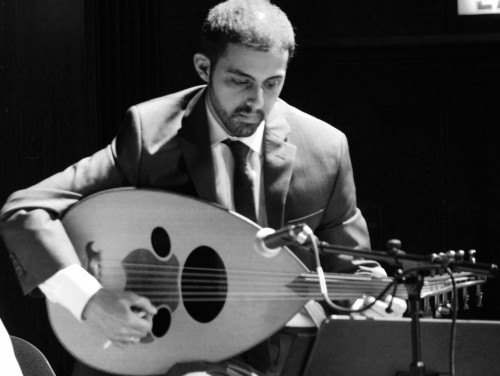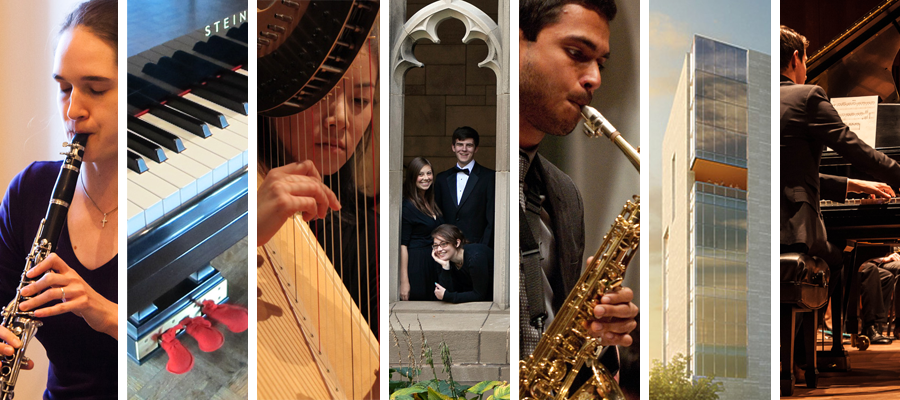 Music Director Wanees Zarour (left) discusses the Middle East Music Ensemble and the upcoming concert.
Music Director Wanees Zarour (left) discusses the Middle East Music Ensemble and the upcoming concert.
On Sunday, December 2nd, the ensemble will perform a FREE concert in the Reva and David Logan Center for the Arts’ Performance Hall. What traditional Middle Eastern instruments will the audience be hearing in this concert?
In addition to the classical western string and woodwind instruments, you will hear stringed instruments unique to the Middle East such as the Oud, Kanun, Lauta, Baglama, Tar, Buzuq, as well as woodwinds such as the Turkish style G Clarinet, and ney. Our percussion section includes Bendirs, riqs, darbukas, and kudum. We have the complete Turkish set.
For those who have never attended a Middle East Music Ensemble concert, can you give an example of what the repertoire of a typical concert consists of? In choosing repertoire for your concerts, do you draw on a wide variety of composers from different countries or is the repertoire often times from a featured country, area, or from a specific time period in the Middle East?
The concerts are typically 1-½ hours long. The repertoire could be Arab, Turkish, or Persian and includes classical and folk music of these regions, both instrumental and vocal. You are expected to hear improvisations, complex musical modes and rhythms, and a variety of heavy and light, slow and fast pieces. In choosing the repertoire, we do tend to pick specific themes, whether they are drawn from a specific era, and country or time period. For example, in the past, we have performed a concert of songs by Lebanese singer Fairouz, entitled “Fairouz and Songs of Lebanon,” a “Muwashahat” (Arabic vocal genre from the Andalusian era) concert, and concert of classical Persian music.
On December 2nd, the 35-piece group will be performing a classical Turkish music concert, mostly consisting of music composed in the Ottoman Empire. For the first time, the first half of the concert will be a traditional “Fasil,” which is a non-stop medley of classical pieces and songs gradually increasing in speed and rhythmic complexity with improvisations in between. A Turkish choir will sing it. The repertoire will include many Turkish favorites, and we have a group of Chicago greats performing with us. This will also be our inaugural concert at the Reva and David Logan Center; we were very much looking forward to it our first performance there.
I understand that you began as a participant with the Middle East Music Ensemble and succeeded to the directing position. How did this transition take place?
The Middle East Music Ensemble is known for its deep involvement with the communities that it represents. Conversely, the community musicians that specialize in this music have supported the ensemble throughout the years by performing, rehearsing, and presenting pieces and sharing ideas. This process of involvement of musicians and experts in the ensemble has led to a rich and engaging learning experience for the other members, and helped the ensemble become a leader in this genre across campuses and professional orchestras that perform this music in this entire region.
I was part of this musician community, supporting and performing in concerts under the former director, Issa Boulos, who has led the ensemble to become a highly recognized practitioner of this music. As a performer and composer of this music, educator and leader of smaller ensembles in Chicago, I felt a deep responsibility to continue the great work that he had done, and keep this ensemble alive. The ensemble continues to grow. It has in fact almost doubled in size in the last two years and we are performing tremendously ambitious and complex repertoire.
As the director of the Middle East Music Ensemble, what do you think this group specifically brings to the Department of Music, the University, and the Hyde Park community?
To the Department of Music, the ensemble brings a measureless opportunity to students, university musicians, and faculty to explore music and techniques that are unique to non-Western traditions. We have a top-notch ethnomusicology program here, and students have taken great advantage of the ensemble’s presence to put theories into practice. Not only do members get to perform, they also learn about the improvisational techniques and performance practices, listen, learn, and communicate with experts in this genre during rehearsals. It’s a very rich learning experience.
The ensemble is very unique to Chicago and to Hyde Park. We are the largest Middle Eastern Ensemble in the United States, and have developed the ability, with the help of community musicians, to effectively switch hats between Turkish, Persian, and Arab music in three separate dedicated concerts. The music is performed in its correct traditional forms. In addition, the ensemble is known for its focus on performance practices, variety in selection, and anthropological approach to training and performing the music. We also feature renowned musicians from across this region.
Interview by Julia Tobiska, Performance Program Assistant
